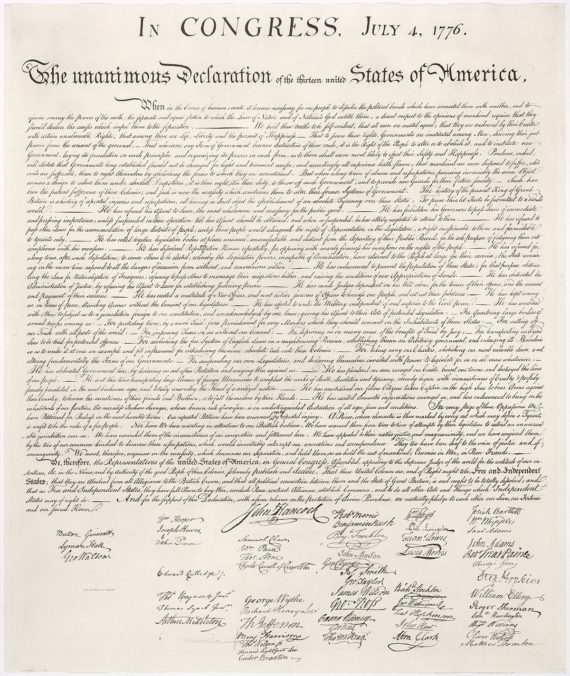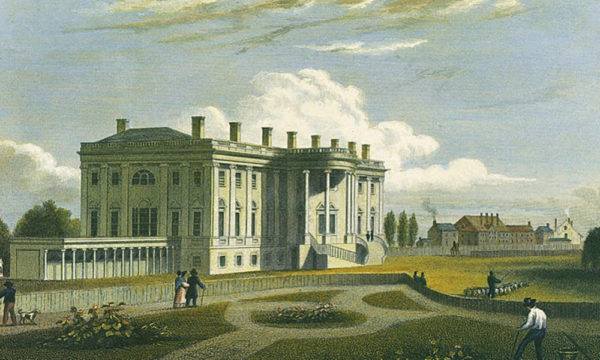“When in the course of human events it becomes necessary for one people to dissolve the political bands which have connected them with another, and to assume among the powers of the earth the separate & equal station to which the laws of nature and of nature’s God entitle them, a decent respect to the opinions of mankind requires that they should declare the causes which impel them to the separation.” Thus, Thomas Jefferson begins his Declaration of Independence.
The American revolutionists in the Continental Congress had decided on a course of independence, and in early June 1776, Jefferson, as a member of a five-man committee—comprising Roger Sherman, Benjamin Franklin, John Adams, Robert Livingston, and Jefferson—was given the task, by the other members, of completing a draft for a formal declaration. He writes in Autobiography, “The committee for drawing the declaration of Independence, desired me to do it.” Jefferson was tasked with the formality, because of his talent with his quill and because much of the dirty work had already been successfully accomplished by the Congress. Thus, someone was needed, as it were, to do the sweeping, and who better than the least senior member of the committee, who was also a Virginian. Consequently, Jefferson sequestered himself on the second floor of a building on 7th and High (Market today) Streets from June 11 to June 28, where he set on the task of writing the Declaration of Independence. There were other committees—e.g., one for a plan for confederating the colonies and another for deciding on terms for forging treaties with other nations.
Yet Jefferson was no ordinary writer. It is impossible not to believe that he took very seriously that task of “sweeping”—that he belabored every sentence, every word, of the document till he settled on a draft worth presenting to the rest of the committee for critical inspection, though only Benjamin Franklin and John Adams would examine the document and they would provide merely cosmetic alterations. The rest of the Congress would blue pencil much of the Declaration, though nothing excised would change Jefferson’s argument.
Jefferson’s 71-word opening salvo, with which I begin this essay, is noteworthy.
Jefferson begins by conceding “political bands” between American Colonists and England. “Political” stands out and—given what Jefferson will say later in the Declaration of the numerous abuses of the Crown vis-à-vis the rights of Americans, considered as citizens of Britain—it is unclear what he means by the word. Were those bonds tight or loose? If loose, were they ever tight?
What next sticks out is the necessity of the dissolution of those bands. That necessity is spelled out some 18-plus grievances, directed at King George III, in contravention of Colonists’ rights.
Again, there is “the separate & equal station to which the laws of nature and of nature’s God entitle them.” Jefferson’s wording in his Summary View two years earlier is “those rights which God and the laws have given equally and independently to all.” In the Declaration, the laws of nature seem to have an axiality that deity does not have, though this might be pettifoggery on my part. Nonetheless, both God and nature’s laws entitle all humans to equality and independence.
What does independence entail?
Jefferson answers with rights, what I take in my book “The disease of liberty”: Jefferson on History and Liberty, to be derivative from equality: life, liberty, and pursuit of happiness. “Life” for Jefferson implies a life that is of one’s own choosing, and it is the same with liberty. “Liberty” too assures one of living according to one’s choosing. And so, as Jefferson says in his Summary View, all people have the God- and nature-given right to expatriate—“of departing from the country in which chance, not choice, has placed them, of going in quest of new habitations, and of there establishing new societies, under such laws and regulations as to them shall seem most likely to promote public happiness.” That is in accord with Jefferson penning “pursuit of happiness,” not “happiness,” in his Declaration—strongly intimating “pursuit of happiness” is a formal declaration of the relativity of happiness for Jefferson. That is why many scholars, among them Duman Malone and Adrianne Koch, take Jefferson to be a political relativist.
Yet Jefferson was too immersed in ancient ethical writings and in the forward-moving climate of the Enlightenment of his day to be a political relativist. He was no political relativist. Many writings of Jefferson, I have decisively shown in Thomas Jefferson, Moralist, show an unswerving commitment to moral and political progress. Jefferson was indebted to Ancient Greek and Roman virtue-ethics theorists (Plato, Aristotle, Aurelius, and Seneca) and utopists of his day (More, Harrington, Mercier, and Condorcet) to better, and worse, ways of living: e.g., agrarianism, authenticity, honesty, frugality, self-sufficiency, and self-reflection being among the virtues adopted for good living or human happiness; manufacture, disingenuousness, lying, prodigality, dependency, and idiocy being among the vices of unhappy persons. In that, Jefferson was consistent with the moral-sense and moral sentiment ethicists of his day, strongly influenced by Greeks and Romans, that he read and ingested: e.g., Lord Kames, Lord Bolingbroke, Francis Hutcheson, and David Hume. His point in choosing “pursuit of happiness” in preference to “happiness” is to emphasize, in keeping with Aristotle and the Stoic Hierocles, is that choosing the right things is needed for virtue.
The Declaration of Independence was no immediate sensation. It was largely ignored by Americans after adoption by the Continental Congress, though Americans came soon to celebrate the day of its adoption. It is the same with other countries, with exception of France, whose revolutionist immediately took to his document.
The document took on a significance beginning early in the 1810s (e.g., Venezuela in 1811 forged its own declaration and Texas in 1836) that perhaps few members of Congress could have envisaged. Nearly 100 countries of the United Nations today have a document like Jefferson’s Declaration. It has unquestionably become a sacred text.
Why is that the case?
The reasons are several. I proffer three.
First, it was written by Jefferson who was a studied, diligent, and intelligent writer. Abraham Lincoln in 1858 said of the brilliancy—its “landmarks,” “grandeur,” “fair symmetry,” and “truths”—of Jefferson’s doctrine:
Now, my countrymen, if you have been taught doctrines conflicting with the great landmarks of the Declaration of Independence; if you have listened to suggestions which would take away from its grandeur, and mutilate the fair symmetry of its proportions; if you have been inclined to believe that all men are not created equal in those inalienable rights enumerated by our chart of liberty, let me entreat you to come back. Return to the fountain whose waters spring close by the blood of the Revolution. Think nothing of me—take no thought for the political fate of any man whomsoever—but come back to the truths that are in the Declaration of Independence. … Do not destroy that immortal emblem of Humanity—the Declaration of American Independence.
Next, it was unoriginal. When Jefferson replied to an accusation by Henry Lee (8 May 1825) that the document was highly unoriginal, he answered:
Neither aiming at originality of principle or sentiment, nor yet copied from any particular and previous writing, it was intended to be an expression of the American mind, and to give to that expression the proper tone and spirit called for by the occasion. All its authority rests then on the harmonizing sentiments of the day, whether expressed in conversation, in letters, printed essays, or in the elementary books of public right, as Aristotle, Cicero, Locke, Sidney, &c.
It is doubtful that Jefferson could have done otherwise, for I have consistently argued that he was fundamentally an unoriginal thinker, though a brilliant man. One can be brilliant and unoriginal. Moreover, truths worth assimilating are assimilable because they are easily expressed and readily accepted—hence, Jefferson’s preference for Jesus’ (simple) teachings in preference to the ancient ethicists.
Last, Jefferson’s Declaration was both timely (political) and timeless (philosophical).
Jefferson wrote about a specific action at a specific time—one action “in the course of human events.” Hence, he grounded the doctrine in a moment in time. That is evident in the manner of specifying the precise violations—he limns at least 18, and he does so in much detail—by the English king of Colonists’ rights.
Yet its value as a sacred document, as “that Immortal emblem of Humanity,” is its timelessness. It is axially philosophical, not political. It, thus, speaks to the heart as well as to the head. It related to people of Jefferson’s day, and so long as people continue to feel, and to think, it will appeal forever to people.
Enjoy the accompanying video….







Thanks, Mark. It’s obvious the Declaration of Independence is the One. Your explanation, being as simple as it should be without messing it up with redundancy, saves the best for last in pointing to it’s timelessness: “It related to people of Jefferson’s day, and so long as people continue to feel, and to think, it will appeal forever to people.”
Everything begins with the Declaration and endorsing signatures which left no room for failure in defiance of the Crown. It’s just as obvious, I believe, the Bill of Rights is as crucial to any chance for continuation of liberty. It was the Constitution that a very recent U.S. president bemoaned as “a charter of negative liberties…. says what the federal government can’t do to you”. The Bill of Rights is certainly the foundation of the Constitution, faithful and jealous reliance upon the first ten amendments being a statement of purpose as is the Declaration of Independence before it. It’s true that Mr. Jefferson’s print is all over the Constitution, given his insistence, via intercontinental mails to his friend, the moderate James Madison, of the inclusion of a bill of rights.
The Declaration of Independence and the Bill of Rights seem like Page 1 and Page 2 of the only instruction we should need.
Thank you for your intelligent comments. Spot on!
If I understand it correctly, Washington pressed for some expression of independence. He knew that the wages of high treason were horrific; that is to be killed or crippled in battle or other forms of attack or, for the leaders at least, to be hanged, drawn and quartered, perhaps the worst form of execution extant! If his men were going to fight, they had to have a sufficient reason to risk all and a war against taxes didn’t cut the mustard! Only the formation of a new country free from British rule was something for which most of his men ~ and Washington himself! ~ would be willing to fight and die.
And we must remember, that these same men and those not actually fighting but supporting those who did, had been moved by OTHER words as with Tom Paine’s Commonsense! So the written word at least at that time, was a very strong weapon for moving people to do what had to be done.
Yup, they did not text back then.
Independence from Britain was only a matter of time. Hard to rule a people some 3,000 miles across the pond. Grossly inefficient.
Thanks!